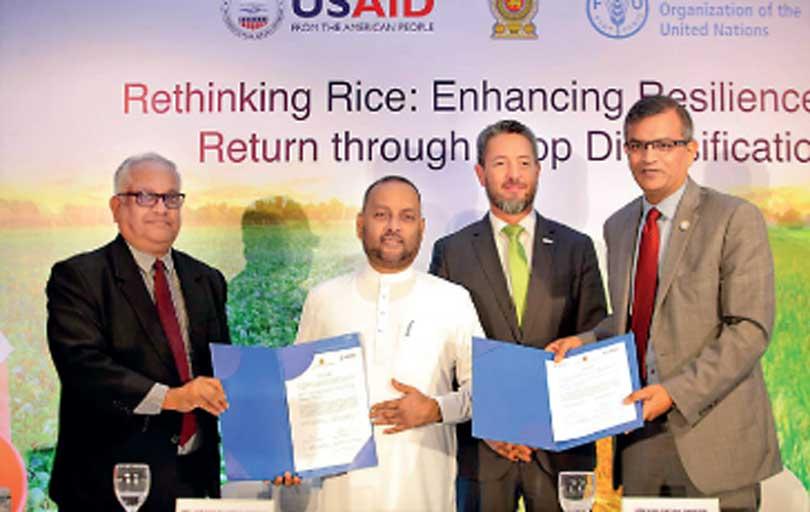11 Jan 2024 - {{hitsCtrl.values.hits}}

Vimlendra Sharan, FAO Representative for Sri Lanka and the Maldives and Janaka Dharmakeerthi, Secretary of the Ministry of Agriculture and Plantation Industries display officially signed project documents in the presence of Minister of Agriculture Mahinda Amaraweera (second from left) and Gabriel Grau, USAID Mission Director for Sri Lanka and the Maldives.
USAID and FAO provided essential fertilizer free of charge for more than 1 million paddy farmers in the country at a crucial time. This initiative builds on that support to continue ensuring increased incomes for the most vulnerable paddy farmers in Sri Lanka,”
-Mahinda Amaraweera Agriculture Minister
This is a significant milestone in our commitment to continue to support Sri Lankan agriculture. By combining resources and expertise, we aim to bring about positive and sustainable changes for the farming community
Vimlendra Sharan FAO Representative
Food and Agriculture Organization (FAO) of the United Nations and the United States through the United States Agency for International Development (USAID) have partnered with the Sri Lanka Ministry of Agriculture in a (US) $9.2-million activity to continue revitalising agriculture in Sri Lanka by enhancing paddy productivity, diversifying crops on marginal land, and promoting sustainable farming practices.
USAID is funding the four-year extension of support to Sri Lankan paddy farmers, which will benefit 10,000 farmers across four districts – Hambanthota, Vauniya, Anuradhapura and Kurunegala. FAO and the ministry will help farmers diversify use of 1,250 hectares of paddy lands during the Yala cultivation season to grow suitable cash crops. In addition, the activity will help farmers use resources such as water and fertilizer more efficiently across 5,000 acres of paddy. The funds also will help establish streamlined supply chains to ensure the timely availability of supplies and machinery to farmers at affordable prices.
The project builds on the United States’ 2022donation of 36,000 metric tons of Triple Super Phosphate and 9,800 metric tons of urea in the midst of the country’s economic and food security crisis, which FAO and the ministry distributed to more than 1 million farmers.
“Our paddy farmers underwent significant challenges over the past few years,” said Agriculture Minister Mahinda Amaraweera in expressing his appreciation for the commitment to revitalize the sector. “USAID and FAO provided essential fertilizer free of charge for more than 1 million paddy farmers in the country at a crucial time. This initiative builds on that support to continue ensuring increased incomes for the most vulnerable paddy farmers in Sri Lanka.”
“USAID is proud to continue our partnership with FAO and the Ministry of Agriculture,” said USAID Mission Director Gabriel Grau. “Our mutual goals for crop diversification and agricultural efficiency are a natural extension of our work to increase productivity of Sri Lankan agriculture and improve the livelihoods of smallholder paddy farmers,” the minister added.
In remarks at the launch of the initiative, FAO Representative Vimlendra Sharan called the partnership with USAID and the Ministry of Agriculture a “significant milestone in our commitment to continue to support Sri Lankan agriculture. By combining resources and expertise, we aim to bring about positive and sustainable changes for the farming community.”
FAO and USAID emphasized their commitment to closely collaborating with the government of Sri Lanka and other key stakeholders to ensure the success of this initiative. By fostering resilience and sustainability, the programme seeks to contribute to the overall recovery of the agriculture sector, promoting increased yield and profitability for smallholder farmers.
27 Apr 2024 3 hours ago
27 Apr 2024 5 hours ago
27 Apr 2024 7 hours ago
27 Apr 2024 27 Apr 2024
27 Apr 2024 27 Apr 2024